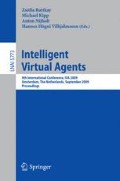Abstract
Many researchers associate a culture with some form of knowledge; other scholars stress the importance of the environment inhabited by the knowledge carriers; while archaeologists learn about cultures through the objects produced in the environment as a result of utilizing this knowledge. In our work we propose a model of virtual culture that preserves the environment, objects and knowledge associated with a certain culture in a 3D Virtual World. We highlight the significance of virtual agents in our model as, on the one hand, being the knowledge carriers and, on the other hand, being an important element establishing the connection between the environment, objects and knowledge. For testing the resulting model we have developed a research prototype simulating the culture of the ancient City of Uruk 3000 B. C. (one of the first human-built cities on Earth) within a Virtual World of Second Life.
Access this chapter
Tax calculation will be finalised at checkout
Purchases are for personal use only
Preview
Unable to display preview. Download preview PDF.
References
White, L.: The Concept of Culture. American Anthropological Association (1959)
Herskovits, M., Jean, M.: Cultural anthropology, Knopf New York (1955)
Dictionary.Com: Definition of Culture. Published Online (accessed February 15, 2009), http://dictionary.reference.com/browse/culture
Addison, A.C.: Emerging trends in virtual heritage. IEEE MultiMedia 7(2), 22–25 (2000)
Gutierrez, D., Frischer, B., Cerezo, E., Gomez, A., Seron, F.: AI and virtual crowds: Populating the Colosseum. Journal of Cultural Heritage 8(2), 176–185 (2007)
Mam, J., Haegler, S., Yersin, B., Mller, P.: Populating Ancient Pompeii with Crowds of Virtual Romans. In: 8th International Symposium on Virtual Reality, Archeology and Cultural Heritage - VAST (2007)
Upal, M.A.: From Artificial Intelligence to Artificial Culture. In: Papers from the AAAI- 2006 Workshop, pp. 1–5. AAAI Press, Menlo Park (2006)
Tylor, E.B.: Primitive Culture. J.P. Putnams Sons, New York (1871)
Kroeber, A., Kluckhohn, C.: Culture: A critical review of concepts and definitions. Random House, New York (1952)
Axelrod, R.: The dissemination of culture: A model with local convergence and global polarization. Journal of Conflict Resolution 41(2), 203–226 (1997)
Carley, K.M.: A theory of group stability. American Sociological Review 56, S331–S354 (1991)
Cohen, J.M.: Sources of peer homogeneity. Sociology of Education 50(4), 227–241 (1977)
Miguel, M.S., Eguiluz, V.M., Toral, R., Klemm, K.: Binary and multivariate stochastic models of consensus formation. Computing in Science and Engineering 7, 67–73 (2005)
Schotter, A.: The Economic Theory of Social Institutions. Cambridge University Press, Cambridge (1981)
Esteva, M.: Electronic Institutions: From Specification to Development. PhD thesis, Institut d’Investigació en Intelligència Artificial (IIIA), Spain (2003)
Uruk Project, http://www-staff.it.uts.edu.au/~anton/Research/Uruk_Project
Bogdanovych, A.: Virtual Institutions. PhD thesis, UTS, Australia (2007)
Bogdanovych, A., Rodriguez, J., Simoff, S., Cohen, A., Sierra, C.: Developing Virtual Heritage Applications as Normative Multiagent Systems. In: Proceedings of the AOSE 2009 Workshop. Springer, Heidelberg (2009)
Summit on Educational Games: Harnessing the Power of Video Games for Learning. Public report, Federation of American Scientists (October 2006)
Author information
Authors and Affiliations
Editor information
Editors and Affiliations
Rights and permissions
Copyright information
© 2009 Springer-Verlag Berlin Heidelberg
About this paper
Cite this paper
Bogdanovych, A., Rodriguez, J.A., Simoff, S., Cohen, A. (2009). Virtual Agents and 3D Virtual Worlds for Preserving and Simulating Cultures. In: Ruttkay, Z., Kipp, M., Nijholt, A., Vilhjálmsson, H.H. (eds) Intelligent Virtual Agents. IVA 2009. Lecture Notes in Computer Science(), vol 5773. Springer, Berlin, Heidelberg. https://doi.org/10.1007/978-3-642-04380-2_29
Download citation
DOI: https://doi.org/10.1007/978-3-642-04380-2_29
Publisher Name: Springer, Berlin, Heidelberg
Print ISBN: 978-3-642-04379-6
Online ISBN: 978-3-642-04380-2
eBook Packages: Computer ScienceComputer Science (R0)

